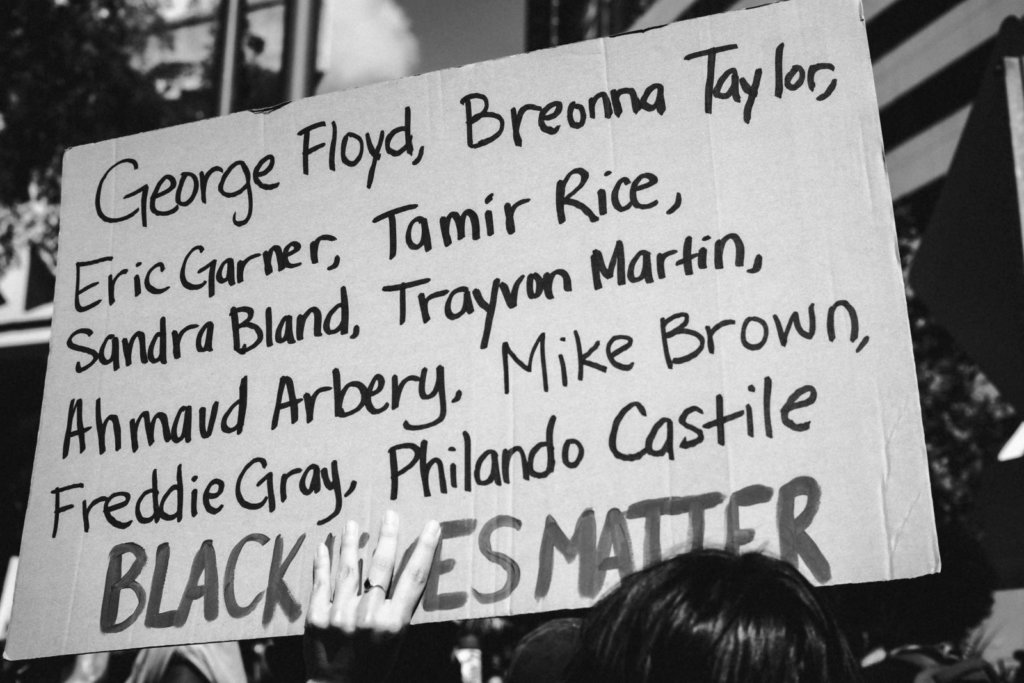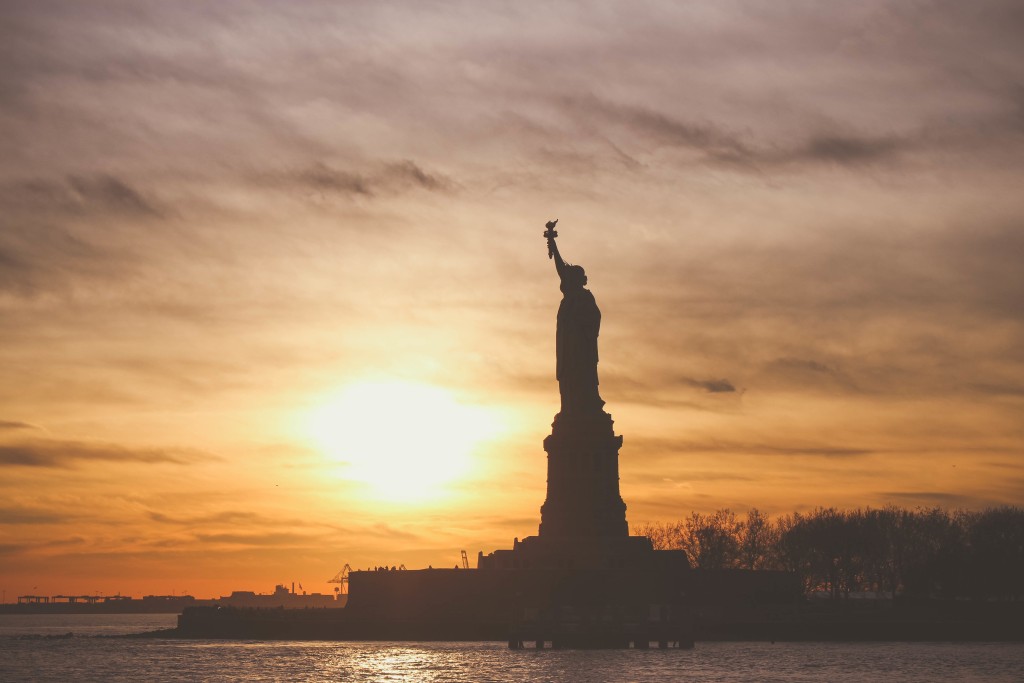As we celebrate Dr. Martin Luther King Jr.’s birthday here in the U.S., I keep thinking about one of my favorite quotes of his. There are many because the man was an eloquent speaker, but in 1963 he said, “Injustice anywhere is a threat to justice everywhere. We are caught in an inescapable network of mutuality, tied in a single garment of destiny. Whatever affects one directly, affects all indirectly. Never again can we afford to live with the narrow, provincial ‘outside agitator’ idea. Anyone who lives inside the United States can never be considered an outsider anywhere within its bounds.”
It’s an interesting concept, and one that continues to be relevant, this notion of “outsider” and how we apply justice to anyone we perceive to be an outsider. Did you know it’s been 20 years since the first detainees arrived at Guantánamo Bay? And that those prisoners were subjected to torture? Only 39 prisoners remain and more than a dozen of them have yet to face charges. They have been dubbed “forever prisoners” by some Democrats. The cost of operating the prison is about $13 million per prisoner every year, according to a Business Insider article! Are you freaking kidding me? I could think of a lot of better uses for $13 million per person.
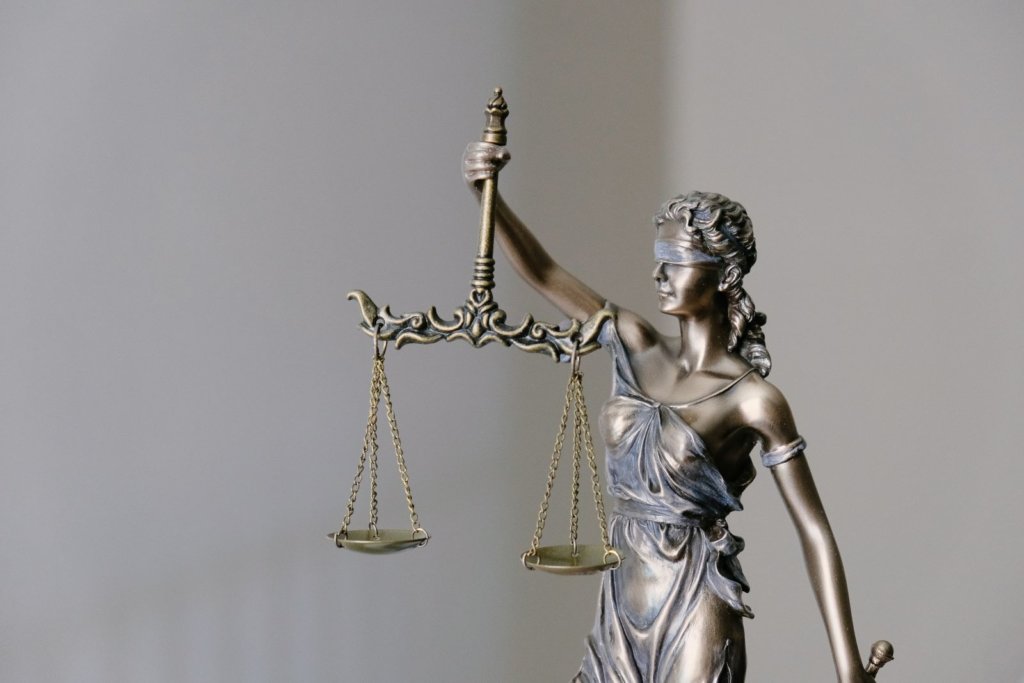
Justice is supposed to be blind, but is it? Photo by Tingey Injury Law Firm on Unsplash
And even if you’re saying, “Yeah but they’re terrorists! They need to be held captive!” The cost to house a single prisoner in California is more than $75,000, according to the LA Times, which is still more than a year at Harvard. Clearly there’s a lot of injustice, a lot of mismanaging funds, and yet a small group of people continue to let incidents like these occur.
It brings to mind an excellent article I read on LitHub by Rebecca Solnit posted in 2018 about how there’s a myth surrounding the “real” America. She wrote:
“[I]n the news and political life, we’re still struggling over whose story it is, who matters, and who our compassion and interest should be directed at.
“The common denominator of so many of the strange and troubling cultural narratives coming our way is a set of assumptions about who matters, whose story it is, who deserves the pity and the treats and the presumptions of innocence, the kid gloves and the red carpet, and ultimately the kingdom, the power, and the glory. You already know who. It’s White people in general and White men in particular, and especially White Protestant men, some of whom are apparently dismayed to find out that there is going to be, as your mom might have put it, sharing. The history of this country has been written as their story, and the news sometimes still tells it this way – one of the battles of our time is about who the story is about, who matters and who decides.”
Precisely. So much of justice and injustice is tied to who matters and who decides. If Black people don’t matter, then it’s fine to kill them in the streets. If terrorists don’t matter, it’s OK to torture them. But who exactly is deciding they don’t matter? And why is that those people are in charge? The reality is the White population in the U.S. is declining and other races are increasing. Where I live, the majority of people are not White. To my mind, that means decisions being made about policies and procedures should take into account that diversity, should recognize this country belongs to everyone who lives here. In essence, to bear in mind what Dr. King mentioned so long ago: that injustice anywhere is a threat to justice everywhere.
I dream of a world where we treat all human beings with love and respect. A world where we value justice not only in word but in action. A world where we celebrate and protect human diversity while also seeking to transcend divisions. A world where we honor Dr. King’s legacy by bringing his dream into reality.
Another world is not only possible, it’s probable.
I have to admit I’m feeling rather spiteful and vindictive. I’m pissed off at the hypocrisy of Mitch McConnell and his ilk regarding replacing Ruth Bader Ginsburg’s justice seat. I’m livid Breonna Taylor’s murderers – Brett Hankison, Myles Cosgrove, and Jonathan Mattingly – were not punished sufficiently for their crimes. I’m angry and frankly scared that Donald Trump will refuse to cede power if he’s voted out. Some vigilante justice sounds mighty appealing right now. However, I also remind myself what my spiritual philosophy says about justice.
First off, it’s a law of nature that for every action there’s an equal and opposite reaction. Actions have consequences, even if they’re not expressed right away. For instance, my spiritual teacher was on a walk with someone when they passed by the house of a Brahmin who just died. My spiritual teacher told his companion:
“Though this man was a prominent member of the Brahmin community, he was not a pious man as befits a Brahmin. In fact, he was a sinful and greedy man who never reflected on his misdeeds or repented for them. He was full of caste vanity and arrogance. Throughout his life he treated the lower castes with scorn. What will be his reward for his pride and vanity? He will be reborn as a dog. If he wanders into a gathering of Brahmins, will they not treat him as an untouchable and drive him away, just as he did to others in this life?”
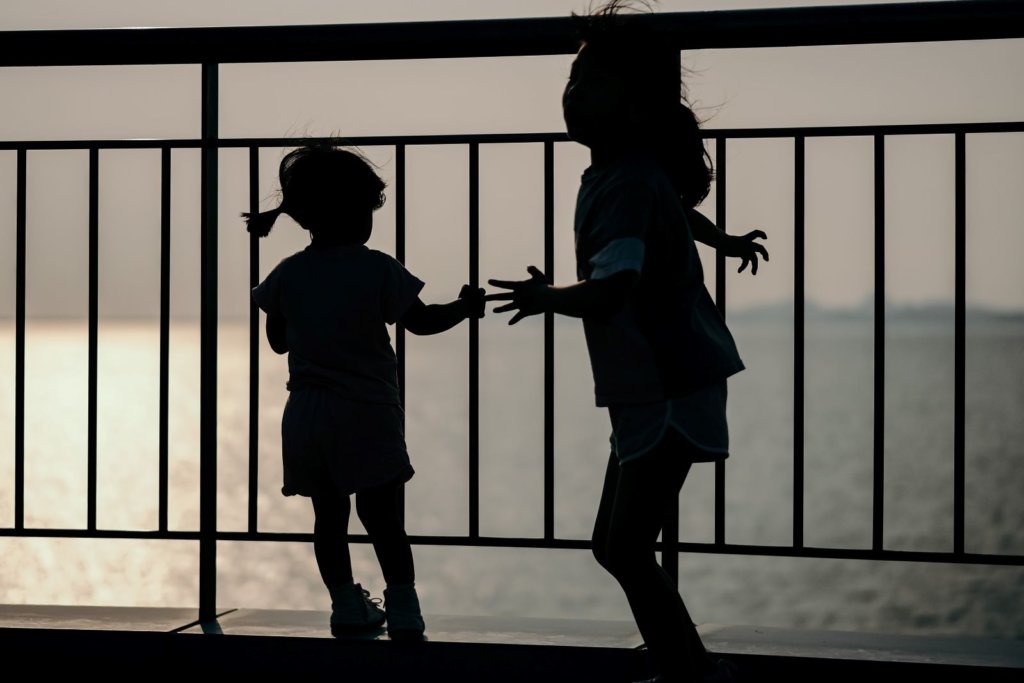
This picture felt like a good mix of imprisonment but also love. Photo by insung yoon on Unsplash
Actions have consequences, for better or for worse. What I notice in telling this story is some glee. My response is, “Good. You got what you deserved.” But sharing that I also feel a pinprick of discomfort because it’s mean-minded. I want to see people punished for their crimes but my spiritual teacher also says we don’t have the right to punish someone we do not love, and furthermore, the amount of punishment meted out must not exceed the amount of love we feel. Yikes. Why is that?
If life is about love, about seeing the divine in everyone, it makes sense that all actions are to be taken with that spirit. If I punish someone out of spite, it creates a feeling of vindictiveness. My mind degrades and the person punished also likely feels resentment. Instead, punishment should be corrective in nature. My spiritual teacher also says, “If a system of corrective measures is introduced, criminals, whether they were deeply involved in the crime or not, will have no reason to complain against anyone. Although there may be flaws in the judgment, it will not harm them in any way. A person who is definitely guilty will benefit from a system of corrective measures, and even a person who is not guilty will benefit from such a system.”
I know I’m being challenged right now to maintain my feelings of love, but what softens my heart is thinking power-hungry people are sick. Those who don’t care one iota about anyone other than themselves are mentally ill. Those who seek to divide others, to promote inferiority and superiority are unwell. As a society, we must take corrective measures – I’m not suggesting we throw our hands up in the air and excuse anyone’s behavior – but can we continue to see God in everyone, especially people we don’t like? That’s the practice anyway.
I dream of a world where we realize the universe will restore balance without any input from us. A world where we recognize actions have consequences for better or for worse. A world where we try to correct others instead of punishing them. A world where we see God in everyone, even people we want to punish.
Another world is not only possible, it’s probable.
I’ve been thinking a lot about freedom because of the July 4th holiday. I’ve been wondering, what does it mean to be free in today’s world when many people are not allowed to live their lives? When they are shot for running down a street? When they are killed in their beds? I’m referencing publicized murders of Black people in the United States of course, but I could also start listing crimes against indigenous people, people of color, those in the LGBTQIA community, Jews, Muslims, and many others. But what’s interesting about this time we’re living in is there’s an added layer about freedom for all of us.
I’m sure you’ve noticed we’re still experiencing a pandemic and many people, regardless of how they identify, are quarantining. A large swathe of us are unable to live our lives the way we used to before COVID-19 struck. Many of us are exclusively working from home. We can’t get our hair cut or work out at the gym. We can’t celebrate together in large groups. We can’t even hug our friends. So again, I ask, what does it mean to be free? I keep thinking about an expression I’ve heard: prison is a state of mind. Surely that’s not true, is it?
I’d like to reference writer Rayya Elias who was incarcerated at Riker’s Island for drug dealing and possession. After she was clean and sober, she wrote a memoir, Harley Loco, and she was invited to speak at the opening ceremony of the prison’s library. Various people filled the audience, including current prison inmates. Elias spoke to the incarcerated women directly and told them this is not who you are, a prisoner in a jumpsuit, and this is not where you live, Riker’s Island.
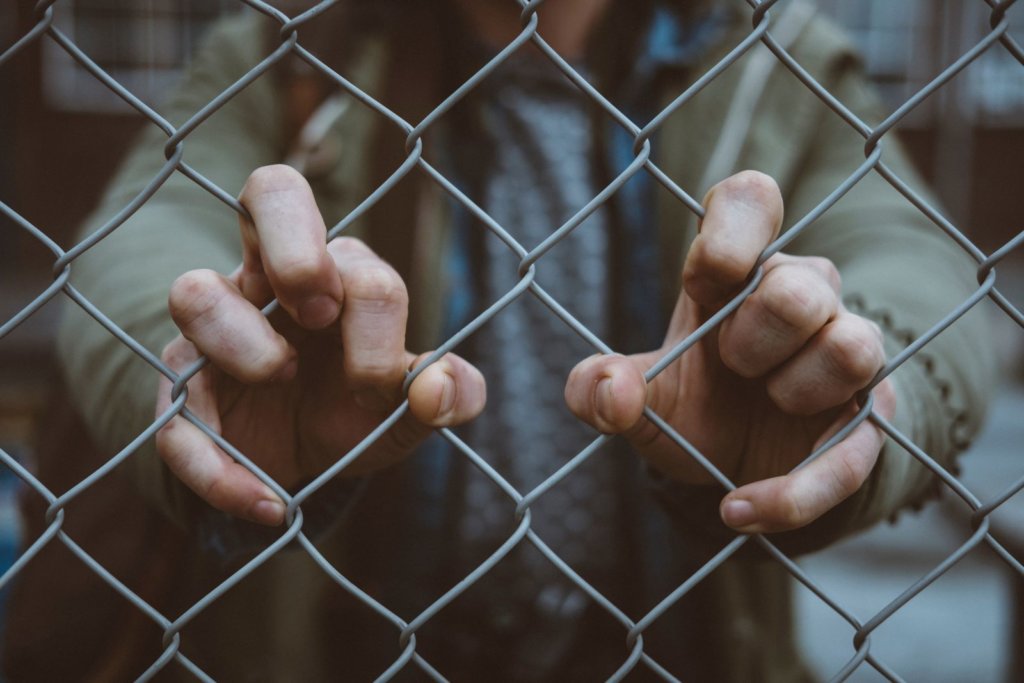
Photo by Mitchel Lensink on Unsplash
Pointing to her heart she said, “This is who you are.” Pointing to her head she said, “And this is where you live.” She reminded them that would always be true – they would always be the people they are in their hearts and they would always live inside their minds. Her statements have stuck with me because she’s right, we do live in our minds and so perhaps that’s where freedom lies as well. Please don’t misunderstand, I’m not saying we should sit back and do nothing about all the injustice going on in the world because we all just live in our heads. What I’m advocating is a three-pronged approach: free our bodies, free our minds, and free our spirits.
A way that I know of to free the mind is to practice meditation. Doing so can free the mind so that a person feels content even while physically imprisoned. That’s not conjecture, by the way. My spiritual teacher modeled that for me. He was jailed and fasted on two cups of liquid for more than five years, but he was still as content as could be. He was an extraordinary human being but he was still a human being. That means he has demonstrated for all of us what is possible. He has shown us that no matter where we are, no matter our circumstances, we can still feel free.
My teacher said practicing santośa, or contentment, will cultivate that feeling. When discussing the intuitional practice of meditation, he said santośa is contentment with receiving things we did not ask for, which to me sounds like freedom.
I dream of a world where we work to free ourselves in body, mind, and spirit. A world where we work to improve the lives of ourselves and others. A world where we remember we live inside our heads. A world where we understand what freedom really means.
Another world is not only possible, it’s probable.
You know the saying, “History doesn’t repeat itself but it often rhymes”? I’m finding that to be true. We’re currently rhyming not only with the 1960s, but also the 1860s. That may sound strange for me to say. How is what the U.S. is going through now anything like the Civil War era?
I’d say we’re already engaged in another civil war, albeit nontraditionally. We don’t have troops marching against one another, but we’re already seeing a fight pitting brother against brother, sister against sister, and sibling against sibling for people who identify as nonbinary. We’re fighting online, in homes, on the streets. We’re fighting with words, and actions, and yes, also guns.
This civil war, like all civil wars, is a battle between the oppressed and the oppressor. For this civil war though, there are no discernible uniforms. It’s harder to identify who’s on what side. Amy Cooper, the woman who called the cops on Christian Cooper in New York City, identifies as a liberal. At least it seems that way given her campaign contributions. It’s not so easy to say Democrats are social justice warriors and Republicans only care about themselves. It’s also not so easy to say if you’re a person of color you’re automatically fighting for justice because one only has to look at the discriminatory policies Ben Carson supports in order to see that’s not true.
A key difference with this civil war though? There is no “North” to escape to. There is no place in the U.S. where people of color have true freedom. George Floyd was killed in Minnesota. So was Philando Castile. “Barbecue Becky” called police on black men barbecuing in my own state of California. These days we’re fighting for a metaphorical North. I say “we” because even though I’m not a person of color, I still have a stake in the game.
The Reverend Dr. Martin Luther King Jr. famously said, “No one is free until we’re all free.” I agree. My freedom, my ability to thrive in this world, is dependent on others being able to do the same. It’s part of why I mentioned in my last post that collective welfare is more important than individual welfare. We can relate that to this ongoing pandemic: If I contract COVID-19, I can spread it to other people. Your health is dependent on my health. That’s why we’re staying at home right now.
If you want another example, when more women work, economies grow, according to the United Nations. If female employment rates in more countries matched that of Sweden, it could boost gross domestic product by more than $6 trillion, the UN said. However, gender gaps cost the economy 15% of gross domestic product.
What would the world look like if people of color were allowed to thrive? What kind of contributions would they be able to make if they didn’t have to work so darn hard just to live? If they didn’t have to be in fear all the time? If they could operate in the world like, well, the average white person?
That’s the world I’m not only dreaming of, but fighting for. I’m not on the streets because my nervous system can’t handle it, but I’m contributing when, where, and how I can. And until that world exists, I’ll continue to fight for it and also dream of it.
I dream of a world where everyone is allowed to thrive no matter their race, ethnicity, gender, sexual orientation, or religion. A world where people can express the fullest, truest versions of themselves without fear. A world where we stand up for one another knowing we’re all interconnected.
Another world is not only possible, it’s probable.
Justice has been on my mind lately. Yesterday, I dressed up as a UPS delivery person in order to serve someone with a restraining order. The thing is, I don’t think the restraining order will do much. I mean, it will in that this woman will no longer be able to harass my friends, but it won’t in that her behavior will continue toward other people instead. There are other neighbors, other situations.
One of the problems I see with our justice system is it’s punitive in nature, not corrective. What are we doing to address the root cause of criminal activity? Merely locking someone away doesn’t do much. My spiritual teacher says a prison should be like a reform school, and the superintendent should be a teacher who is trained in psychology and who has genuine love for society.
I’m not naive enough to believe we can live in a world without criminals, but I do think we can change how we deal with them and also work on prevention. When I was in Denmark, I walked through the train lugging all my stuff with me on the way to the bathroom and people looked at me funny. Later, I asked my friend about it, and she said they were amazed I carried my belongings with me because theft is not as common in Denmark. It does happen, just not to the same degree as it does in the U.S. That’s because people are paid better and there are more social safety nets. People aren’t as inclined to steal because they don’t have to. However, there are natural-born criminals, and for them, something still needs to be done.
My teacher asserts that born criminals commit their crimes due to their physical or psychic abnormalities and that capital punishment is akin to cutting off the head to get rid of a headache. He also says, “In my opinion, to take the life of a born criminal of this type is as much a crime as it would be to pass a death sentence on a patient just because we could not cure the person’s illness. It is the duty of a civilized society to arrange for born criminals to be cured of their ailments. Killing them to lighten the burden caused by their lives is certainly not indicative of a developed civilization.”
A possible solution then is to isolate criminals, yes, but while they’re in prison to have them work with psychologists, physicians, and sociologists to undergo deep transformation. Other options include re-education on what is right and wrong, and making prison a more pure environment so the prisoners aren’t tempted to go back to their old ways. Also, considerations must be made for the families of criminals to ensure the family isn’t forced to engage in crime themselves just to survive.
I know there are a lot of quotes and ideas mentioned in this post, but really what I’m getting at is our justice system needs to be more humane, more benevolent. Merely serving someone with a restraining order or throwing them behind bars doesn’t accomplish much. We are all people and deserved to be treated with love and respect. We all deserve a more just society and in part, that comes from changing how justice is served.
I dream of a world where our justice system is revamped. A world where prisons become corrective centers and prisoners are patients. A world where we abolish the death penalty and instead start engaging in solutions that will result in lasting change.
Another world is not only possible, it’s probable.
